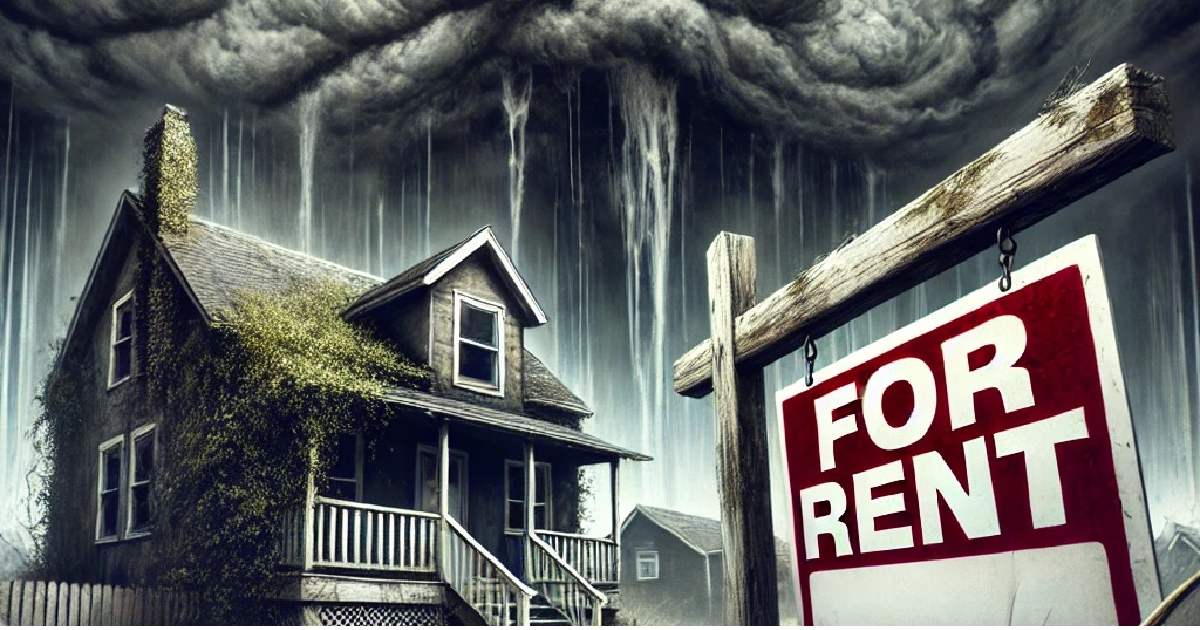As an experienced real estate investor and property manager, I’ve seen the rental housing market boom—and I’ve seen it crash. The signs of trouble are always there, but many landlords don’t recognize them until it’s too late. I’ve learned the hard way that when the rental market begins to deteriorate, the domino effect can be brutal.
I want to share with you what I’ve seen before—what I’m seeing now—and what you should watch for to stay ahead of the curve. If you own investment properties, especially in Florida, understanding this cycle can mean the difference between financial ruin and positioning yourself for the opportunities that follow.
1. Homes Sit Vacant for Months
One of the first warning signs is that homes stop renting quickly, even in high-demand areas.
During the 2006-2008 crash, I watched as well-located single-family rentals in Tampa, Orlando, and Miami sat empty for months. Landlords dropped rents, but demand still didn’t pick up. Today, I’m seeing early indicators of this in some Florida cities where rent growth has stalled, and listings are lingering on the market longer than before. When you see this happening in your local housing market – and especially in your portfolio, it’s time to pay attention.
2. Lowering Rents Doesn’t Fix the Problem
Many landlords think that if they just lower their rents, tenants will start moving in. But when the market is sliding, that’s not always the case.
Back in 2009, investors in Florida slashed rents by hundreds of dollars per month, yet their properties remained vacant. Why? Because the tenants they were trying to attract had already lost their jobs or were struggling financially. Even today, in some parts of Florida, we’re starting to see rental concessions—free months of rent or discounted deposits—become more common. This is a leading indicator that demand is weakening. Will it result in a full-fledged market correction? It’s too early to know, but it’s a warning sign.
3. Tenants Fall Behind on Rent and Evictions Skyrocket
As the economy weakens, tenants start missing rent payments.
I managed homes in Florida during the Great Recession, and I saw this firsthand. Tenants who had been reliable for years suddenly stopped paying. Evictions surged, but that created another problem—many of these tenants had nowhere to go. Some squatted in properties for months, while others left in the middle of the night, abandoning everything they owned.
Today, rising inflation and layoffs in tech and hospitality industries are beginning to put pressure on renters. If we hit another downturn, landlords could once again see a wave of missed rent payments and evictions.
4. Properties Start Deteriorating as Tenants Struggle
When tenants are financially strapped, home maintenance is the last thing on their minds.
In 2007-2009, Landlords across Florida saw properties deteriorate as tenants, unable to pay rent, stopped caring for their homes. Without cash flow, owners were unable to make repairs. The cost to repair these homes skyrocketed, adding financial strain to investors who were already struggling.
5. Evicted Tenants Trash Homes on Their Way Out
Evictions aren’t just expensive; they’re often destructive.
During the last housing crisis, I saw tenants retaliate by leaving water running, pouring cement down toilets, stealing HVACs and appliances on their way out the door, or setting fires before abandoning the property. Florida landlords were hit hard, facing tens of thousands of dollars in unexpected repairs. If you start seeing more evictions in your market, prepare for rising repair costs and longer turnaround times to get homes re-rented.
6. Landlords Face Soaring Renovation Costs
After tenants leave, landlords face a tough decision—pay for expensive renovations or sell at a loss.
I watched many Florida investors struggle with this choice 2008-2011. Some couldn’t afford to fix their homes, so they let them sit empty. Others took out loans to renovate, only to realize that rental prices had dropped so low they couldn’t cover their costs. The result? More financial distress for investors.
7. Newly Renovated Homes Hit the Market Below Cost
Even those who could afford renovations found themselves in a bind—potential rental income had bottomed-out and had dropped below the cost of repairs and the mortgage. Investment properties were no longer cashflow-positive.
This is exactly what happened in Florida cities like Miami, Tampa, and Jacksonville in the early 2010s. Landlords who spent thousands on renovations found that the market had shifted so drastically that they could no longer charge enough in rent to break even. Many were forced to sell at a loss.
8. Investment Property Owners Start Foreclosing
As more landlords fail to make mortgage payments, we see a flood of properties hit the market.
From 2009-2012, Florida was one of the hardest-hit states for foreclosure. Entire neighborhoods were filled with vacant, bank-owned homes. Some investors tried to sell before foreclosure, leading to a wave of short sales. But with so many distressed properties hitting the market at once, prices plummeted even further.
We are no where close to this stage now, but it’s an important history lesson for us to remember. If economic conditions worsen, this is what could be coming.
9. The Market Bottoms Out—And Opportunity Arrives
Eventually, prices hit rock bottom. And when that happens, the investors who prepared in adavce are the ones who win big.
By 2012, hedge funds and cash buyers swooped into Florida and started buying rental homes in bulk. Properties that had been abandoned or left in foreclosure were suddenly selling at bargain prices. Smart investors saw what was happening, bought up distressed assets, and turned them into high-yield rental properties.
This is where the biggest opportunities exist—on the other side of the crash.
What This Means for Investors Today
Right now, we’re seeing some early signs of rental market weakening in parts of Florida. It’s no-where close to 2008 yet, but smart investors will look for the signs and will be prepared.
If you’re a rental property owner, here’s what you should do:
- Watch your local market closely. If vacancies start rising and rent concessions increase, take action before you’re in trouble.
- Strengthen your tenant screening process. You want the most financially stable tenants possible.
- Set aside cash reserves. If the market worsens, you’ll need liquidity to survive.
- Think long-term. If home prices drop, be ready to buy when the market hits bottom.
A market downturn isn’t the end of the world—it’s a wealth-building opportunity for those who know how to play it.
I’ve been through this before. I saw the warning signs, I learned from my mistakes, and I came out stronger on the other side. If you recognize what’s happening now, you can do the same.
And when the dust settles, the investors who stayed informed and prepared will be the ones ready to seize the biggest opportunities yet.





